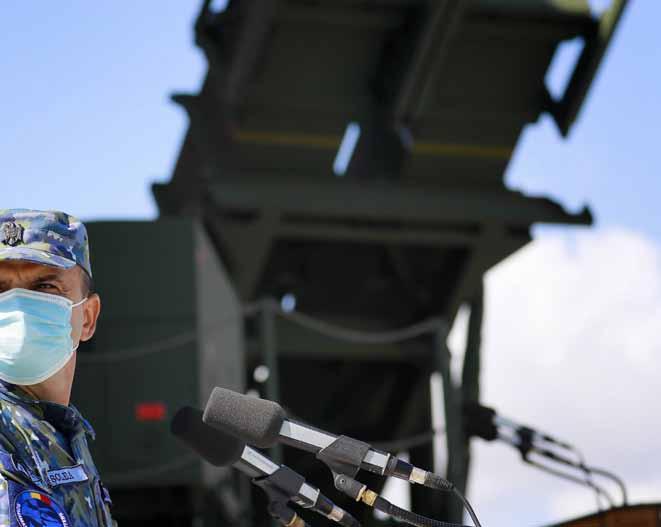
11 minute read
INTERNATIONAL AFFAIRS
US PRESENCE IN THE WESTERN BALKANS AFTER JOE BIDEN’S VICTORY
Jakub Lachert
Advertisement
The United States’ presence in the Western Balkans began when the war in former Yugoslavia had ended. The American administration developed the Dayton Agreement, regulating the post-war order in the region. In recent years, the main reason for the US interest in this area has been its integration into NATO, which included Montenegro, North Macedonia and Croatia, the last not being considered a Western Balkan state after its accession to the European Union. The US presence in the region also serves a military purpose. Approximately 7,000 American soldiers are stationed in Camp Bondsteel, the main American base in Kosovo, which is under the supervision of the Kosovo Force (KFOR). This facility is used by allied forces, including Polish troops under the KFOR mission until 20141 .
After the November US presidential election, one should present the potential changes to the Western Balkans policy under the administration of the President-elect Joe Biden in comparison to the accomplishments of the outgoing President Donald Trump.
The new US administration is likely to put an emphasis on greater collaboration with the European Union (EU) on the Western Balkans. During Donald Trump’s presidency, American diplomacy was focused on conducting independent
1 https://www.army-technology.com/, accessed November 18, 2020.
activities in this region, also contrary to the interests of the European Bloc. Such was the case of Serbia which moved its embassy from Tel Aviv to Jerusalem, as specified in the economic agreement with Kosovo2 . This could pose a problem in relations between Serbia and the European Union because, according to the Bloc, diplomatic missions should remain in Tel Aviv until the Israeli-Palestinian conflict is resolved.
JOE BIDEN’S ACTIONS IN RELATION TO THE WESTERN BALKANS TO DATE
The future position of Joe Biden on the Western Balkans can be outlined by taking into account the President-elect’s approach towards the region over the last thirty years when he held prominent positions in the United States administration. In the 1990s, he advocated American intervention in Bosnia and Herzegovina and involvement in Kosovo. His son Beau Biden served there as an advisor to the US Department of Justice on matters related to the rule of law. During Barack Obama’s presidency, Joe Biden, as the Vice President, was actively involved in the peace process between Kosovo and Serbia. He visited these places both at the beginning and at the end of his term.
POSSIBLE ACTIONS OF THE BIDEN ADMINISTRATION OVER THE WESTERN BALKANS
The new administration of Joe Biden as President of the United States is likely to look for different solutions from those implemented by Donald Trump, who treated the policy towards the Western Balkans as an opportunity to promote his office. The agreement signed between Kosovo and Serbia, although quite spectacular in the media, did not result in any breakthrough. Assigning Richard Grenell, a diplomat inexperienced in the sensitive issues of the dispute, to the peace
2 UE ostrzega Serbię i Kosowo przed przenoszeniem ambasad z Tel Awiwu do Jerozolimy, https://studium. uw.edu.pl/, accessed September 10, 2020.
© Robert Ghement (PAP/EPA)
process might have been a sign of some ad hoc American actions in the region. The peace talks in the Western Balkans require a lot of political experience and patience in building alliances. The continuation of the peace efforts between Kosovo and Serbia seems a fundamental challenge for all parties. Without resolving the dispute between Belgrade and Pristina, the EU will not be able to continue the integration process of these countries. However, from Washington’s perspective, the enduring political instability in the Western Balkans is a threat to American interests. Abandoning the region by the United States and the EU would create favorable conditions for China and Russia to expand their spheres of influence.
It can therefore be assumed that Joe Biden’s administration will react to

A ROMANIAN MILITARY, BACKED BY A PATRIOT MISSILE LAUNCHER, LOOKS FOR THE ARRIVAL OF THE HIGHRANKED OFFICIALS PRIOR THE RECEPTION CEREMONY OF THE FIRST PATRIOT SURFACE-TO-AIR MISSILE SYSTEM, AT THE NATIONAL TRAINING CENTER FOR AIR DEFENSE “BRIGADIER GENERAL ION BUNGESCU” FROM CAPU MIDIA SHOOTING RANGE. CONSTANTA COUNTY, ROMANIA, SEPTEMBER 17, 2020.
Chinese and Russian involvement in the Western Balkans mainly in terms of Montenegro and Serbia. Both countries remain most committed to the process of European integration. Additionally, Montenegro also belongs to NATO. Simultaneously, both states pursue a multi-sectoral policy, cooperating with China and Russia. Such a strategy of Podgorica and Belgrade is due to two reasons. Firstly, accession to the European Union is a multi-stage process. The moment when both countries will be able to join the community is still unknown given the attitude of some EU countries. Secondly, their democratization process should be considered. In recent years, there has been an observable decline in the freedom of the media, the fight against corruption, and the rule of law in these countries. Furthermore, progress in dialogue between the European Union and the Western Balkan states may depend on the attitude of Washington. Its close cooperation with the EU on reforms in the countries of the region is likely to have a positive impact on prodemocratic attitudes in societies, which are discouraged from the rise of populism, especially in Serbia.
However, it should be noted that the Western Balkans do not receive considerable attention in the US policy and the region-related actions of the US diplomacy will come down to the issues that are the most significant from the US viewpoint. During Barack Obama’s presidency, a “pivot to Asia” was announced. It focused the efforts of the US diplomacy on building an American sphere of influence in the Pacific.

FROM LEFT: SLOVENIAN PRESIDENT BORUT PAHOR, CROATIAN PRESIDENT KOLINDA GRABAR KITAROVIC, US VICE PRESIDENT JOE BIDEN, AND EUROPEAN COUNCIL PRESIDENT DONALD TUSK ATTEND A PRESS CONFERENCE AT THE PRESIDENTIAL PALACE DURING THE BRDO-BRIJUNI PROCESS LEADERS MEETING. ZAGREB, CROATIA, NOVEMBER 25, 2015.
© Antonio Bat (PAP/EPA)
These attempts were expected to result in coalitions with countries competing with the People’s Republic of China, a country being the greatest geopolitical and economic challenge for the United States3 . The global rivalry between the US and China is manifested in various domains, primarily in the economic field. During the presidency of Donald Trump, the US administration conducted activities aimed at counteracting economic domination of China, for instance by trying to oust Chinese technology companies from the allied countries. The American mediation on economic issues between Kosovo and Serbia also involved the limiting of the activities of Chinese corporations, especially in Serbia. Signed in September, an agreement contains a provision that “both parties will prohibit the use of 5G equipment in their mobile communication networks, which is delivered by an unverified seller,” which, of course, includes devices from companies based in communist China such as Huawei and ZTE4 .
3 Lieberthal, K. G., American Pivot to Asia, https:// www.brookings.edu/, December 21, 2011. 4 Domachowska, A., Serbia i Kosowo: porozumienie o normalizacji relacji ekonomicznych, Instytut Europy Środkowej, Lublin, September 8, 2020. Undoubtedly, the Western Balkans are within the scope of China’s economic interests. This area is a logistics hub for the Middle Kingdom in trade with Western Europe. Certainly, it will remain under watch of Joe Biden’s administration. Therefore, it seems that Washington’s strategy towards the plans of Beijing for the Western Balkans will remain consistent with the Donald Trump’s policy.
THE THREE SEAS INITIATIVE AS A GEOPOLITICAL BASE OF THE UNITED STATES
On November 18, the US House of Representatives supported the Three Seas Initiative and declared that it would provide one billion dollars for this project. The initiative came from Democrat Marcy Kaptur and had bipartisan support.
The Three Seas Initiative is a PolishCroatian geopolitical project associating twelve countries (EU members) located in Central and Southeast Europe. Four of these nations – Croatia, Hungary, Romania, and Bulgaria – border the Western Balkans. The main objective of this scheme is to support energy and infrastructure projects and exert a positive effect on the immediate vicinity, including the countries of the Western Balkans
amid joint projects due to their location. Moreover, it can be assumed that this initiative could also include the Western Balkan nations which will join the European Union.
The members of the Three Seas Initiative also belong to NATO (with the exception of Austria) and are close allies of the United States, especially Poland and Romania that host American military bases.
It seems that members of the Initiative, given their pro-American attitude in foreign policy as well as an interest in European and transatlantic integration with the Western Balkans, could be vital partners for American diplomacy in its efforts to force Russian and Chinese influence out of the Balkans.
However, American diplomacy under Biden is likely to focus on rebuilding good relations with Western European countries, for instance Germany, with which the incumbent president of the United States had disputes over climate issues or defense spending. Consequently, it can be assumed that throughout Biden’s term, security issues in the Western Balkans will be resolved in partnership with Paris and Berlin.
Most likely, this will not lead to abandoning the Three Seas Initiative and support for it, as this project offers military benefits to the United States. It brings together the countries being part of the eastern flank of NATO, thus providing a buffer zone between Russia and Serbia – nations engaged in military cooperation.
THE UNITED STATES AND THE SECURITY IN THE WESTERN BALKANS
From the US standpoint, eliminating the influence of the Russian Federation in the Western Balkans is crucial. To achieve this goal, political and economic cooperation with the Republic of Serbia has to be intensified. Belgrade’s policy is aimed at diversifying alliances in international politics. Economically, Belgrade is strengthening cooperation with the European Union, China, and Turkey. During the first wave of the COVID-19 pandemic, Serbia received help and medical assistance from China. On the other hand, Russia provides equipment for the Serbian army and cooperates with Belgrade by organizing joint military maneuvers. However, the European Union and the United States are capable of counteracting this collaboration. Feeling pressure from the EU, Serbia boycotted the military maneuvers, which took place in Belarus in September in parallel to mass protests against the rigged presidential election.
The greatest difficulty in establishing positive relations between the United States and Serbia was continuing hostility from part of the Serbian population to the US intervention in Serbia in 1999 (within the framework of NATO). The country was then bombed, causing multiple civilian casualties. This military operation was triggered by the intensification of hostilities in Kosovo, where Serbian troops were carrying out ethnic cleansing of Kosovo Albanians. Consequently, it can be assumed that during Joe Biden’s presidency, Serbia’s attitude towards NATO will not change. The more so that the majority of Serbian society is against this organization – approximately 79% of the population opposes joining the alliance5. However, Belgrade participated in North Atlantic Alliance initiatives such as the Partnership for Peace. Consequently, from the standpoint of Joe Biden’s administration, it seems that involvement in Serbia will be limited to
5 Political parties in Serbia support cooperation with NATO, but without membership, https:// europeanwesternbalkans.com/, December 25, 2019.

BULGARIA AND THE US ARE HOLDING THE JOINT MILITARY TRAINING AT THE NOVO SELO SITE IN EASTERN BULGARIA, AS PART OF THE BULGARIAN-AMERICAN PLAN FOR JOINT MILITARY TRAININGS AND EXERCISES. NOVO SELO, BULGARIA, 2015.
© Vassil Donev (PAP/EPA)
economic initiatives and efforts to reach an agreement with Kosovo.
SUMMARY
The United States’ policy towards the Western Balkans during the presidency of Joe Biden will be based on two pillars. Firstly, it will concern the cooperation with the European Union and NATO (in the region) to build a common security zone. The main challenges for the US administration will be to counteract the economic, political, and military influence of China in the Western Balkans. Secondly, in terms of the strategic dimension, Washington will rely on the alliance with France and Germany to strengthen relations between the United States and the European Union, strained during Donald Trump’s presidency.
The cooperation between the United States and the countries of the Three Seas area will depend on security challenges in the region. The members of the project may turn out to be an important ally of the United States in case of increased tensions between Washington and Moscow amid the Western Balkans. Furthermore, the countries of the Three Seas region are vital for eliminating the influence of the Chinese economic expansion as Chinese infrastructure projects run through their territories. Through investments such as a high-speed rail link between Belgrade and Budapest, China wants to extend its sphere of influence in Western Europe. From an American perspective, China’s economic expansion in Europe threatens political and, of course, economic interests.
It can be assumed that with regard to the main goals of American diplomacy there will be no significant change in policy regarding the core alliances in the Western Balkans. However, the United States is likely to abandon attempts to build relations with the region independently of the EU, while it will coordinate dialogue with these countries with Brussels.
Jakub Lachert
December 2020










